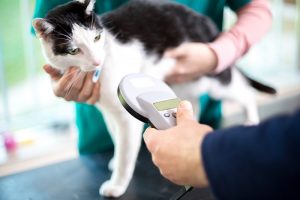
Pet Indentification – Tags, or Microchip?
“My cat has a collar and tag – why does he need a microship?”
I look to the animal shelters and SPCA filled with stray animals. Many of these animals had collars and tags….but they do not arrive with them. Collars can fall off, get hooked on a branch, break the clasp (or have it open with the newer quick release collars). Any of these can leave your pet without identification and on the receiving end of a quick trip to the SPCA. The first thing they do is look for microchips – these are the most failsafe ways to ensure that your pet arrives back home to you.
Nobody expects to lose their pet, yet it happens all too often. A great number lost or stolen pets never make it back home. To maximize the chance of having your beloved pet returned, we strongly recommend you have him/her micro-chipped.
MICROCHIP
- Advantages: This microchip can be scanned by any animal shelter or veterinary office and the encoded information entered into a data base to trace the pet back to its owner. The data base is North America-wide and covers much of Europe as well. Does not require sedation to be inserted.
- Disadvantages: Slightly more expensive than tags.
What type of identification does your pet have? Contact us at (604) 521-0781 for more information about pet microchips.
The Case for Health Insurance for Pets
Our pets are members of our family. As pet owners, we are familiar with the change in family dynamics when our four legged family members become sick. Too often as a veterinarian, my patients are unable to receive optimal treatment for their illness due to financial constraints – and too often this can be a question of their survival.
Pet insurance gives me peace of mind, knowing that if there is an emergency situation, I will be able to manage it financially. I suspect that many pet owners do not know that pet insurance covers routine wellness procedures such as dental treatments and wellness visits. In Europe, 30% of pet owners have insurance. In North America, only 3% of owners have policies. I have first hand seen the benefits to pets and their families on having coverage.
As a veterinarian I advocate pet insurance and encourage owners to look into covering their pets. However, when looking for a policy, there are questions that you should ask as a lot of them do not work in the same way as human health policy. The following web site outlines some of the concerns pet owners should have:
http://www.howtodothings.com/pets-and-animals/a4120-how-to-buy-pet-insurance.html
At Care Pet Wellness Group, we are not directly associated with any insurance company or any insurance product. Any member of our team would be happy to answer any questions you may have about this subject, or you can visit:
